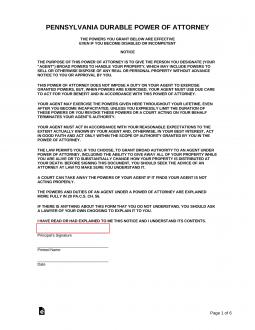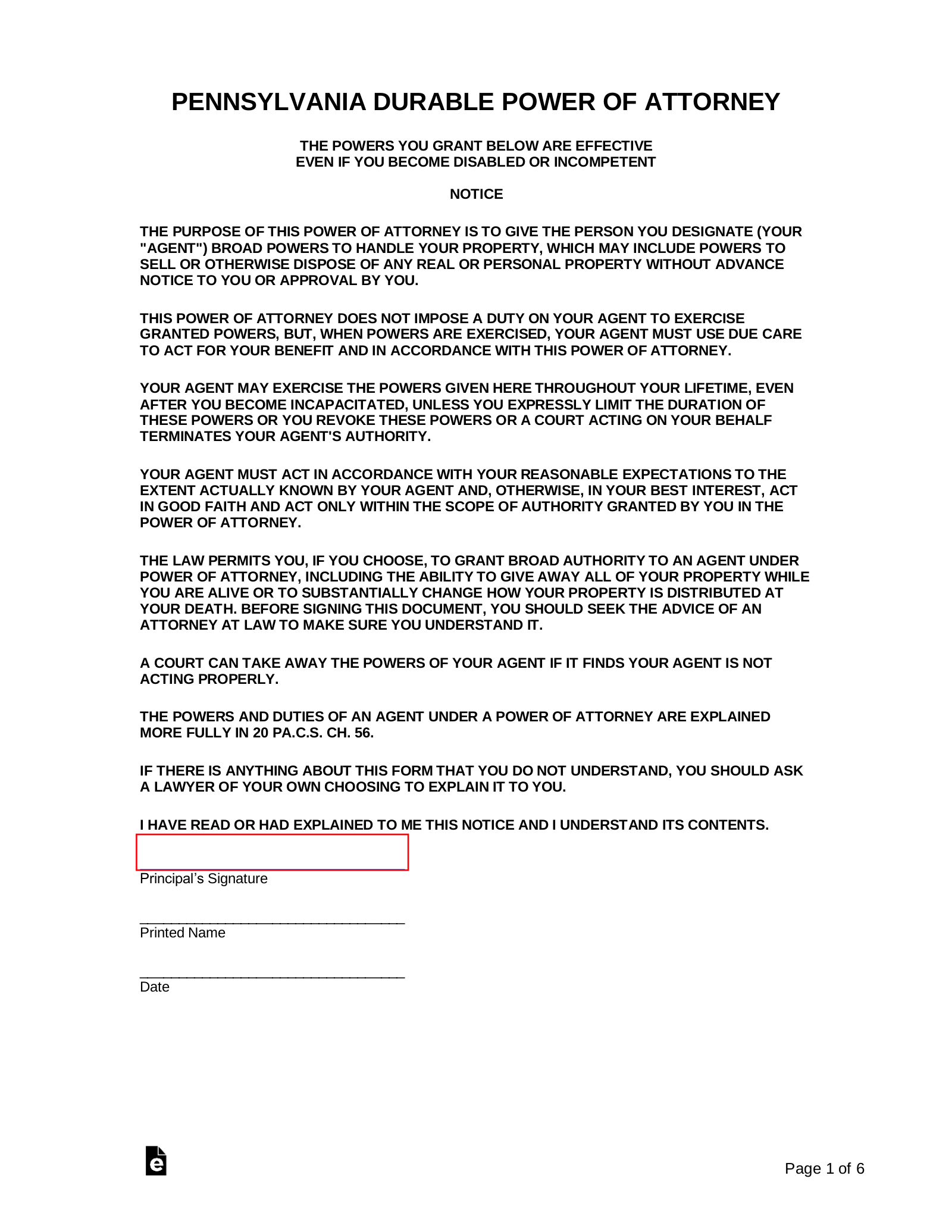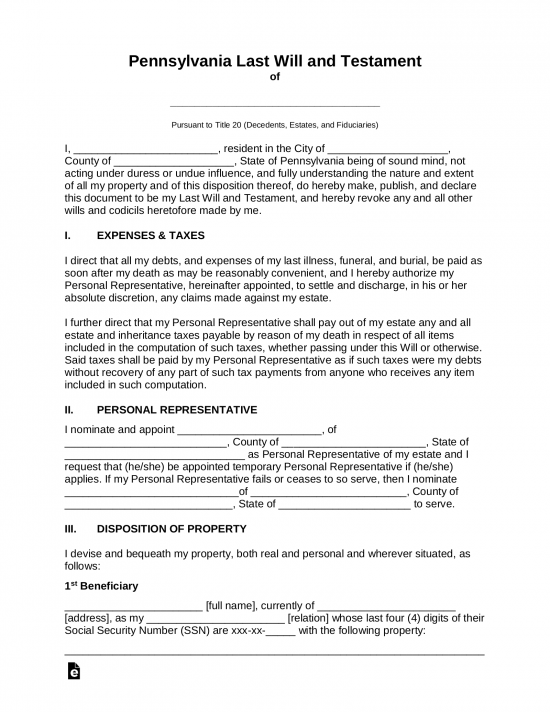Updated April 02, 2024
A Pennsylvania durable power of attorney form allows a person to delegate any type of financial responsibility to another person. This means a person (“principal”) can choose to give someone else (“agent”) powers from paying bills to buying and selling real estate on their behalf. Durable powers of attorney remain in effect until the death of the principal. Therefore, it’s important to select an agent that is trustworthy.
Table of Contents |
Laws
Title 20, Chapter 56 (Powers of Attorney)
Definition of “Durable”
A durable power of attorney is a power of attorney by which a principal designates another his agent in writing. The authority conferred shall be exercisable notwithstanding the principal’s subsequent disability or incapacity. A principal may provide in the power of attorney that the power shall become effective at a specified future time or upon the occurrence of a specified contingency, including the disability or incapacity of the principal (§ 5604(a)).
Definition of “Power of Attorney”
The Pennsylvania statutes do not define “power of attorney” but do provide a list of abilities that an agent is presumed to have and those that an agent is granted only if specifically granted in the document (§ 5601.4).
Signing Requirements
The principal is required to sign in the presence of a notary public and two (2) witnesses. The agent is required to sign and may do it themselves and does not need to be acknowledged and without witnesses (§ 5601(b)(3)). Unless specifically provided otherwise in the power of attorney, all powers of attorney shall be durable (§ 5601.1).
Statutory Form
The Pennsylvania statutes do not reproduce a sample statutory form, but do provide suggestions for drafting language at § 5602.
How to Write
Download: PDF, Microsoft Word (.docx) or Open Document Text (.odt)
1 – Obtain The Pennsylvania Paperwork Necessary To Delegate Principal Authority
Download the template on this page. The Principal will need to be present to complete the form, so make sure you have coordinated with his or her schedule. You will need information regarding the Principal, the Attorney-in-Fact, and the Powers being granted.
2 – The Principal Must Read And Sign The Introductory Notice
The first page of this document will provide some valuable information for the Principal, including the exact Pennsylvania Statutes that apply to this documentation. The Principal should make sure to read this disclosure, then provide a Dated Signature At the bottom of this page. The Principal will also need to supply his or her Full Name in print.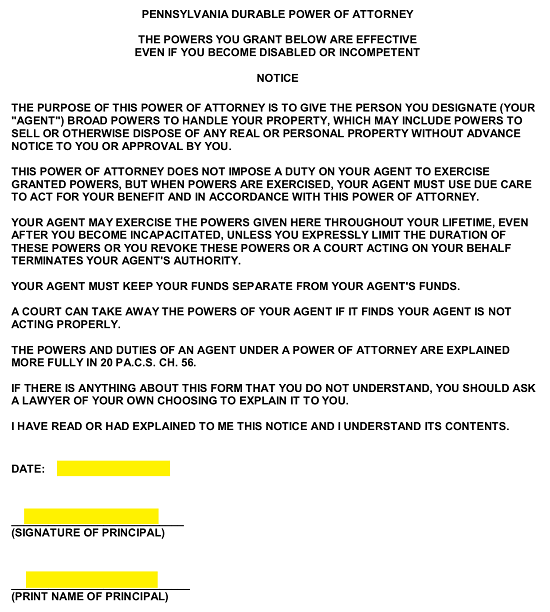
3 – Supply A Report On This Document’s Participants
Once the Principal has read, comprehended, and signed the disclosure, the first paragraph can be attended to. It will request some information via a set of blank lines. The first blank line in this paragraph will need to have the Principal’s Full Name and Address placed on it. Make sure when filling in the Name of the Principal that it matches the Name of the Principal as he or she produced it below the Principal Signature. 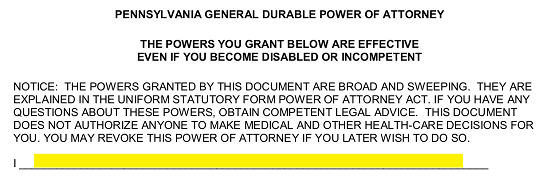 Next, after the word “Appoint,” solidify who the Principal is giving Principal Authority to by entering the Agent’s Name on the second blank line along with his or her Address.
Next, after the word “Appoint,” solidify who the Principal is giving Principal Authority to by entering the Agent’s Name on the second blank line along with his or her Address.![]()
4 – A Principal Approved List Of Delegated Authority Must Be Produced
After supplying the declaration statement with information, the Principal should review the lettered list of subjects that he or she may delegate Power to an Agent using this paperwork.
The Principal should initial the statement A, “Real Property Transactions,” if the Agent will be expected to perform the actions such as (but not limited to) selling or conveying real Property with Principal Authority. If the Agent must be able to handle “Tangible Personal Property Transactions” (i.e. receiving and possessing Personal Property on behalf of the Principal), the Principal will need to initial Statement B
If the Agent must be able to handle “Tangible Personal Property Transactions” (i.e. receiving and possessing Personal Property on behalf of the Principal), the Principal will need to initial Statement B The wording in Statement C will deliver the ability to perform “Stock And Bond Transaction” in the Principal’s Name once the Principal initials the corresponding blank line. If initialed, this statement will allow the Agent to buy stocks, exchange them, or even vote at meetings on behalf of the Principal.
The wording in Statement C will deliver the ability to perform “Stock And Bond Transaction” in the Principal’s Name once the Principal initials the corresponding blank line. If initialed, this statement will allow the Agent to buy stocks, exchange them, or even vote at meetings on behalf of the Principal. The Agent will be able to control the selling or buying of the Principal’s Commodities and Options on behalf of the Principal along with a host of other actions as per Statement D. If the Principal wishes to appoint the Agent with the Authority to conduct such business, then he or she must initial the “Commodities And Option Transactions” paragraph.
The Agent will be able to control the selling or buying of the Principal’s Commodities and Options on behalf of the Principal along with a host of other actions as per Statement D. If the Principal wishes to appoint the Agent with the Authority to conduct such business, then he or she must initial the “Commodities And Option Transactions” paragraph. The Principal can appoint the Agent with the Principal Power to engage in Banking transactions with Banks and Financial Institutions in general (on behalf of the Principal) by initialing the “Banking And Other Financial Institution Transactions” paragraph.
The Principal can appoint the Agent with the Principal Power to engage in Banking transactions with Banks and Financial Institutions in general (on behalf of the Principal) by initialing the “Banking And Other Financial Institution Transactions” paragraph. Paragraph F will supply the structure and wording to allow the Agent to conduct Principal Business Affairs in any lawful Business on behalf of the Principal. The Principal should present his or her initials on the blank line corresponding to the “Business Operating Transactions” paragraph.
Paragraph F will supply the structure and wording to allow the Agent to conduct Principal Business Affairs in any lawful Business on behalf of the Principal. The Principal should present his or her initials on the blank line corresponding to the “Business Operating Transactions” paragraph. If the Principal wishes to have the Agent engage in exercising any “Insurance And Annuity Transactions” on his or her behalf, then he or she must initial Statement G.
If the Principal wishes to have the Agent engage in exercising any “Insurance And Annuity Transactions” on his or her behalf, then he or she must initial Statement G. The ability to represent the Principal in matters of “Estate, Trust, And Other Beneficiary Transactions” can be granted to the Agent by the Principal, after the Principal locates Statement H and initials the blank line preceding it.
The ability to represent the Principal in matters of “Estate, Trust, And Other Beneficiary Transactions” can be granted to the Agent by the Principal, after the Principal locates Statement H and initials the blank line preceding it. The Agent can have the same Authority the Principal carries regarding commencing, discontinuing, or generally engaging in “Claims And Litigation” in Principal matters after the Principal supplies his or her initials on the blank line preceding “(I) Claims And Litigation”
The Agent can have the same Authority the Principal carries regarding commencing, discontinuing, or generally engaging in “Claims And Litigation” in Principal matters after the Principal supplies his or her initials on the blank line preceding “(I) Claims And Litigation” To appoint the Agent with the Principal Power to handle the Principal’s “Personal And Family Maintenance” (i.e. hiring accountants, contractors) then he or she should initial Statement J.
To appoint the Agent with the Principal Power to handle the Principal’s “Personal And Family Maintenance” (i.e. hiring accountants, contractors) then he or she should initial Statement J. The Power to represent the Principal regarding his or her “Benefits From Social Security Medicare, Medicaid, Or Other Governmental Programs Or Military Service” can be granted to the Agent when the Principal initials the blank line labeled “(K)”
The Power to represent the Principal regarding his or her “Benefits From Social Security Medicare, Medicaid, Or Other Governmental Programs Or Military Service” can be granted to the Agent when the Principal initials the blank line labeled “(K)” The Agent can wield Principal Authority to handle his or her “Retirement Plan Transactions” through the Principal Act of initialing item “(L).”
The Agent can wield Principal Authority to handle his or her “Retirement Plan Transactions” through the Principal Act of initialing item “(L).” The Authority to handle the Principal’s affairs and represent the Principal before Tax Entities will be delivered to the Agent if the Principal initials Statement “(M) Tax Matters.”
The Authority to handle the Principal’s affairs and represent the Principal before Tax Entities will be delivered to the Agent if the Principal initials Statement “(M) Tax Matters.” The Agent can be granted the Power to handle all of the above matters in one fell swoop if the Principal initials “(N) All Of The Powers Listed Above.” If this statement is initialed, the Principal should not initial any other statement.
The Agent can be granted the Power to handle all of the above matters in one fell swoop if the Principal initials “(N) All Of The Powers Listed Above.” If this statement is initialed, the Principal should not initial any other statement.![]()
5 – Some Additional Issues Should Be Reviewed And Determined
If the Principal has any additional instructions that should be listed and included in this paperwork he or she should make them available and document them in the contents of this template. This can be accomplished using the section labeled “Special Instructions.” If more room is required, you may continue this report on a well-labeled attachment that must be physically present at the time of signing.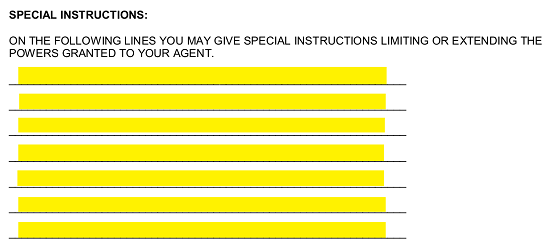 Next, locate the paragraph labeled “Authority To Delegate.” If the Principal wishes the Agent to possess and use Principal Power to delegate the Principal Powers delivered here to other entities, then leave this statement intact. If the Agent should not be able to delegate any of the appointed Powers to another party, then strike through each line of this paragraph with horizontal lines or cross it out.
Next, locate the paragraph labeled “Authority To Delegate.” If the Principal wishes the Agent to possess and use Principal Power to delegate the Principal Powers delivered here to other entities, then leave this statement intact. If the Agent should not be able to delegate any of the appointed Powers to another party, then strike through each line of this paragraph with horizontal lines or cross it out. If the Principal wishes to give the Agent the Principal Authority to receive compensation for reasonable expenses while carrying out the Principal’s directives, then leave the paragraph labeled “Right To Compensation.” If the Agent should not have the Authority to decide upon this and act on behalf of the Principal he or she should, this paragraph should be crossed out or struck through.
If the Principal wishes to give the Agent the Principal Authority to receive compensation for reasonable expenses while carrying out the Principal’s directives, then leave the paragraph labeled “Right To Compensation.” If the Agent should not have the Authority to decide upon this and act on behalf of the Principal he or she should, this paragraph should be crossed out or struck through. The Principal may decide to appoint another entity as a Successor Agent who will act as a reserve Agent. This means that if the Attorney-in-Fact named above will not or cannot wield Principal Powers, the Successor Agent will be able to step into this role, able to wield the same Principal Powers delegated to the Attorney-in-Fact named above. The Successor Agent may only do this if he or she has her Name, Address, and Telephone Number documented on the blank lines in the “Successor Agent” section.
The Principal may decide to appoint another entity as a Successor Agent who will act as a reserve Agent. This means that if the Attorney-in-Fact named above will not or cannot wield Principal Powers, the Successor Agent will be able to step into this role, able to wield the same Principal Powers delegated to the Attorney-in-Fact named above. The Successor Agent may only do this if he or she has her Name, Address, and Telephone Number documented on the blank lines in the “Successor Agent” section.
5 – The Principal Will Need To Supply This Document With His Or Her Dated Signature
Once the Principal has determined this document reflects his or her intentions perfectly, then he or she should prepare to sign his or her Name by producing the current Date when he or she signs this paperwork across the three blank lines after the words “Signed This…”  Once the current Date has been documented by the Principal he or she must sign the “Your Signature” line.
Once the current Date has been documented by the Principal he or she must sign the “Your Signature” line.
6 – Additional Entities Must Sign This Paperwork To Prove Its Authenticity
Both Witnesses must read the “Statement Of Witness” paragraph then, sign his or her Name, print his or her Name, and disclose his or her Address. The next entity to help prove this document’s reliability will be the Notary Public. This person is the only party who can notarize this paperwork using the “Certificate Of Acknowledgment Of Notary Public” section.
The next entity to help prove this document’s reliability will be the Notary Public. This person is the only party who can notarize this paperwork using the “Certificate Of Acknowledgment Of Notary Public” section.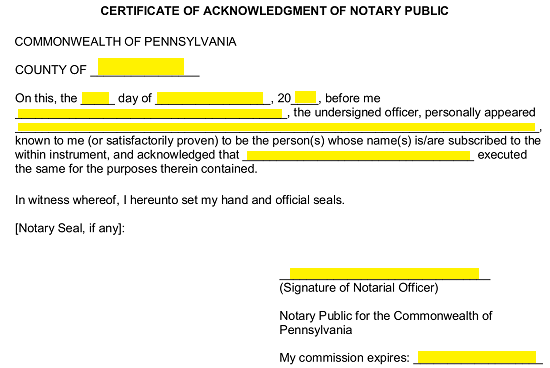 The final section, “Acknowledgement Executed By Agent,” will require the cooperation of the Agent or Attorney-in-Fact being granted the Principal Authority defined. Locate this section, then enter the Full Name of the Attorney-in-Fact on the first blank line. The Attorney-in-Fact must sign and print his or her Name on the blank lines labeled “Agent’s Signature” and “Agent’s Printed Name” (respectively). Once he or she has completed this task, the Attorney-in-Fact must then enter the current Date on the line below his or her Name.
The final section, “Acknowledgement Executed By Agent,” will require the cooperation of the Agent or Attorney-in-Fact being granted the Principal Authority defined. Locate this section, then enter the Full Name of the Attorney-in-Fact on the first blank line. The Attorney-in-Fact must sign and print his or her Name on the blank lines labeled “Agent’s Signature” and “Agent’s Printed Name” (respectively). Once he or she has completed this task, the Attorney-in-Fact must then enter the current Date on the line below his or her Name.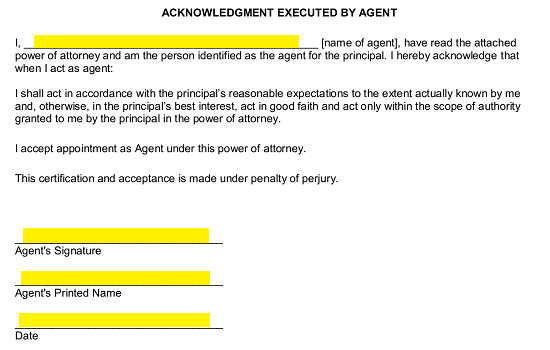
Related Forms
Download: PDF

